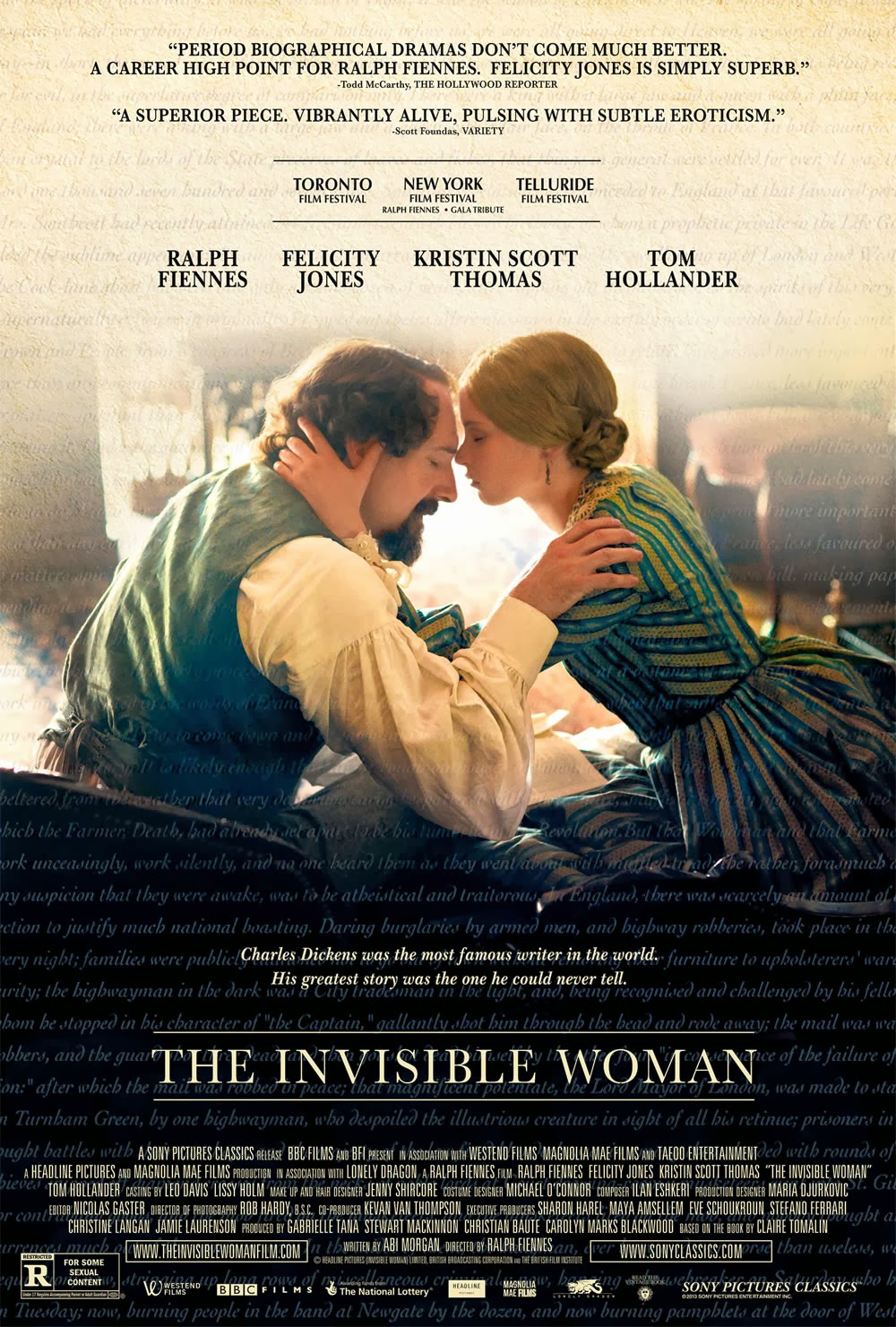The Invisible Woman (2013)
Just to be clear, this post does not refer to the film of the same name released in 1940. It has no elements of science fiction--instead it's reference to invisibility is social, not scientific.
It tells the story of Ellen Turner, who was the mistress of Charles Dickens. It is the directorial debut of Ralph Fiennes, who plays Dickens, and is something of a feminist look at how women were treated in the Victorian era.
As competent as the film is, I can't help but wondering, two days later, "So what?" The screenplay is by Abi Morgan, who also wrote The Iron Lady and Shame. I can't help but wonder what the angle Morgan was trying to take--that it's a man's world? This is not new information.
Fiennes, as Dickens, is at the height of his popularity, and putting on a play by his friend Wilkie Collins in Manchester. An actress (Kristin Scott Thomas) brings along her three daughters to be in the play as well. Dickens is taken with the youngest, Ellen, or Nellie (Felicity Jones). Dickens' wife (Joanna Scanlan) has grown heavy and is not an intellectual match for him. He is ever drawn to the company of Jones, so much so that Thomas, understanding that Jones is not a great actress, should become his mistress. In something of a business transaction, Jones is packed off to Dickens.
While their relationship is meant to be a secret, whispers abound, and Scanlan knows about it. But Dickens eventually separates from her, and we at least do see the pain his indiscretion causes. But he remains a jolly figure, adored by the public. Jones has to live a secret life, and eventually will take another name and marry, her relationship with Dickens skewed to becoming merely a childhood acquaintance.
As a director, Fiennes knows his best asset is Jones' face, and it is lovely to look at. Her performance is more than adequate, but the whole thing has a kind of arid feel to it. We do see some sex scenes (obliquely), but there isn't a lot of passion expressed between anyone. As for the influence she had on Dickens, there is a suggestion he changed the ending to Great Expectations because of her, but I'm unconvinced.
I wonder how anyone decided to make this a movie at all. It was based on a book, which I'm sure is of interest to Dickens scholars and those who study the history of women in Victorian England, but it doesn't make for a crackerjack entertainment. The Invisible Woman is okay but dull.
My grade for The Invisible Woman: C.
It tells the story of Ellen Turner, who was the mistress of Charles Dickens. It is the directorial debut of Ralph Fiennes, who plays Dickens, and is something of a feminist look at how women were treated in the Victorian era.
As competent as the film is, I can't help but wondering, two days later, "So what?" The screenplay is by Abi Morgan, who also wrote The Iron Lady and Shame. I can't help but wonder what the angle Morgan was trying to take--that it's a man's world? This is not new information.
Fiennes, as Dickens, is at the height of his popularity, and putting on a play by his friend Wilkie Collins in Manchester. An actress (Kristin Scott Thomas) brings along her three daughters to be in the play as well. Dickens is taken with the youngest, Ellen, or Nellie (Felicity Jones). Dickens' wife (Joanna Scanlan) has grown heavy and is not an intellectual match for him. He is ever drawn to the company of Jones, so much so that Thomas, understanding that Jones is not a great actress, should become his mistress. In something of a business transaction, Jones is packed off to Dickens.
While their relationship is meant to be a secret, whispers abound, and Scanlan knows about it. But Dickens eventually separates from her, and we at least do see the pain his indiscretion causes. But he remains a jolly figure, adored by the public. Jones has to live a secret life, and eventually will take another name and marry, her relationship with Dickens skewed to becoming merely a childhood acquaintance.
As a director, Fiennes knows his best asset is Jones' face, and it is lovely to look at. Her performance is more than adequate, but the whole thing has a kind of arid feel to it. We do see some sex scenes (obliquely), but there isn't a lot of passion expressed between anyone. As for the influence she had on Dickens, there is a suggestion he changed the ending to Great Expectations because of her, but I'm unconvinced.
I wonder how anyone decided to make this a movie at all. It was based on a book, which I'm sure is of interest to Dickens scholars and those who study the history of women in Victorian England, but it doesn't make for a crackerjack entertainment. The Invisible Woman is okay but dull.
My grade for The Invisible Woman: C.



Comments
Post a Comment